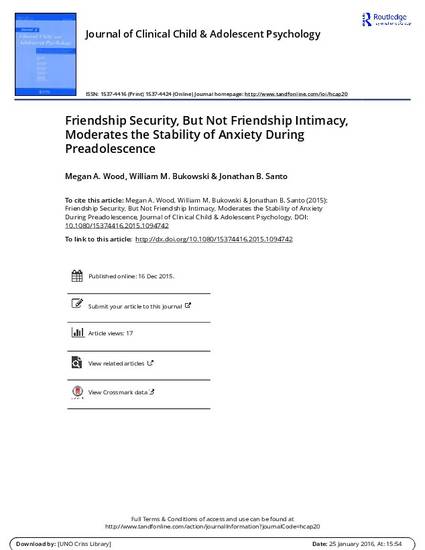
Article
Friendship Security, But Not Friendship Intimacy, Moderates the Stability of Anxiety During Preadolescence
Journal of Clinical Child & Adolescent Psychology
(2015)
Abstract
A two-wave longitudinal study of 380 preadolescents (M age = 10.87) from largely middleclass schools in Montréal, Québec, Canada, assessed the hypothesis that friendship security, but not friendship intimacy, moderates the stability of anxiety during adolescence. This central but largely overlooked question about peer relations concerns which aspects of friendship account for the effects of friendship on emotional adjustment. Anxiety and friendship quality were measured via self-report questionnaires, employing the Network of Relationships Inventory for security and intimacy items. An index of friendship durability, which combined reciprocity and stability within first- and second-best friendship choices, was derived from sociometric measures. A latent variable path analysis examined with structural equation modeling showed that anxiety was less stable for children who perceived their friendships as secure. The moderating effect of intimacy was statistically nonsignificant. A follow-up analysis showed that the effects of security did not result from friendship durability. These findings provide support for the long-standing but previously unaddressed hypothesis that security, rather than intimacy, accounts for friendship’s effect on anxiety reduction during early adolescence.
Disciplines
Publication Date
2015
Citation Information
Jonathan Bruce Santo. "Friendship Security, But Not Friendship Intimacy, Moderates the Stability of Anxiety During Preadolescence" Journal of Clinical Child & Adolescent Psychology (2015) Available at: http://works.bepress.com/jonathan_santo/24/
